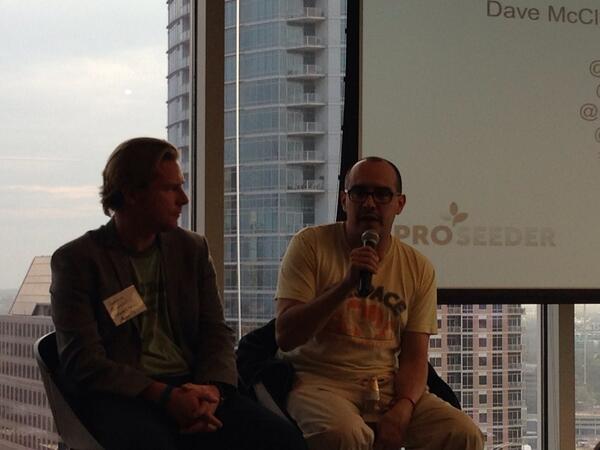During a fireside chat at SXSW, Georgetown Angels’ General Partner Andrew Romans spoke with Dave McClure, founding partner of 500 Startups, a global early-stage seed fund and accelerator program, to discuss McClure’s insights and 500 Startups’ practices. In addition, five startups pitched at the event including Partender, Rchery, CoinMKT, MusicQubed and Dealflicks.
Many in the tech and startup space are eager to learn about McClure’s projects and to receive his advice. When people were either losing their jobs or were fearful of losing their jobs during the economic downturn in 2008, McClure was hired. He does not speak five or more languages, but he is bullish on international markets where most investors tread lightly and focuses on startups that are solving problems for e-commerce, consumers, small businesses, and departmental enterprise.
500 Startups’ investing thesis is that scale matters. “Through most of the 2000s, I noticed that there wasn’t a lot of thoughtful innovation going on in the VC world. Traditional deal structure from the late 1990s to early 2000s was mostly Series A investing at about $1 to $3 million. By 2004-2005, that cost had come down to about $250K,” said McClure. While the cost of building companies was going down, the size of deals was going up. “We don’t need a lot of dollars to be relevant…companies need to be raising $500K to $1 million, but we can be meaningful capital with $1-$100K.”
McClure added that a Series A isn’t always the goal when raising funds. “Sometimes companies can be successful by raising $2 million in capital, make $2 million in revenue, break even and have some modest level of growth.” According to McClure, 500 Startups has seen around 25-30 exits, with four of those over $100 million. “Our general model is that we’d like to see a return of capital come from around 30% of the portfolio…7x to 10x or better.”
Although the number of active VC firms has dropped, there’s new money coming into the market from retail market investors, angel investors, governments, corporates, a few larger players, and more recently, a new set of seed funds. But this will also change. “In general, the market dynamics and ecosystem are more efficient than ever before…but it is the allocation of capital that is distorted.“ McClure believes that will begin to change within the next five to ten years. “When the majority of capital is constrained to the 20 miles between San Francisco and Mountain View, and a majority of growth lies where six billion people live outside of the U.S., we have a lot more work to do on the investor, angel, and seed fund education side than we do on the entrepreneur side.”
McClure emphasized how challenging it is for entrepreneurs in these markets to get access to capital because investors haven’t seen exits in these markets yet. But he thinks that’s going to change dramatically, because the macro trend is up. “There’s definitely good reason why Apple, Amazon, Samsung and all other hardware manufacturers’ stocks are up. People all over the planet, from all different demographics, are buying personal devices of any and all kinds.”
McClure also noted that there is innovation going on these days from groups such as Google Ventures and Andreessen Horowitz on the high end, and Betaworks. So how does McClure keep the innovation moving at 500 Startups? In addition to running accelerator programs in San Francisco, Mountain View and Mexico City, the Accelerator Program is looking to expand its international investments. “We’ve been pretty active in Latin America and Southeast Asia and we’re starting to spend more time in the Middle East and Eastern Europe.”
500 Startups is also beginning to experiment more with AngeList. “We’re running two new syndicates. We haven’t made investments on them yet, but we likely will…one that’s focused on women founders and we’ll probably be launching a similar one for regional-focused syndicates.”
When it’s time to decide who to invest in, the answer for 500 Startups is rooted in the quality of the product and the product’s method for reaching consumers. “Our sweet spot for investing is a functional product with modest customers, that can use platforms like Facebook, Twitter, or Google for customer acquisition. There’s somewhere between 5-10 major platforms that have billions of users that aren’t being used well for customer acquisition. Search and social are basically well understood, but mobile, video and local are not. The major trend going on isn’t technology–it’s the consumer adoption of messaging and communication platforms.”





